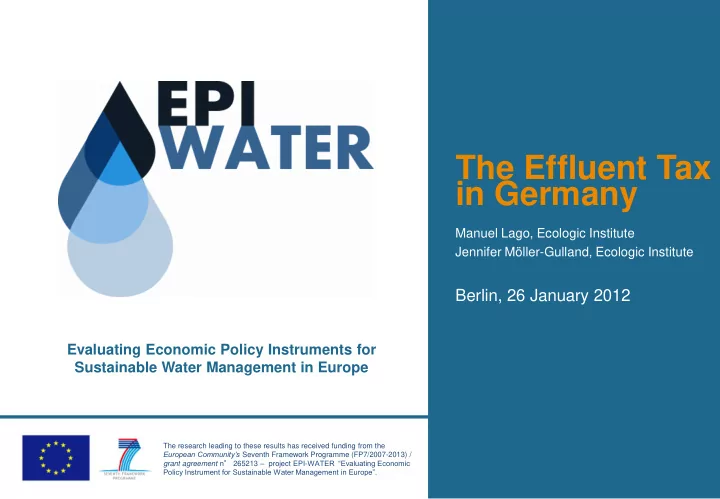

The Effluent Tax in Germany Manuel Lago, Ecologic Institute Jennifer Möller-Gulland, Ecologic Institute Berlin, 26 January 2012 Evaluating Economic Policy Instruments for Sustainable Water Management in Europe The research leading to these results has received funding from the European Community’s Seventh Framework Programme (FP7/2007-2013) / grant agreement n ° 265213 – project EPI- WATER “Evaluating Economic Policy Instrument for Sustainable Water Management in Europe”.
1. Structure of the presentation • Background and problem definition • The policy mix – shifting the focus to EPIs • Components • German Federalism • Environmental outcomes from the policy mix • Analysis • Uncertainty • Conclusions 1
2. Background and problem definition • Since 1957 all discharges required a permit (Federal Water Act) • Exceptionally high growth in pollution-intensive sectors in the post war (WWII) period serious environmental problems • Construction of wastewater treatment facilities did not keep pace with rising effluent volumes Insufficient implementation of direct regulation, partly due to lack of capacity within governmental administrations Direct regulation failed to incentivize investments in effluent abatement 2
3. The solution: The policy mix – shifting the focus to EPIs • Discharge Permits (Federal Water Act, implemented in 1957) • Effluent Tax (Effluent Tax Act; implemented in 1976) • Implements the “polluter pays principle” • Economic incentive to avoid or reduce harmful effluent discharges • Revenue earmarked for investments in water quality programs by Länder • Discharge limits and technological standards (Waste Water Ordinance; implemented in 1997) 3
4. Introduction of the policy mix: German Federalism • Effluent Charges Act (1976) was passed as a framework law at federal level German Länder had to transpose this law into Länder legislation • Most Länder passed the law in 1981 • Following German re-unification, the five new Länder transposed this legislation in 1991 • Länder had a certain degree of discretion when transposing the Effluent Charges Act 4
5. Environmental Outcomes of the policy mix • Change in behaviour • Reduction in wastewater development during production process, e.g. paper industry • Reduction of discharge of pollutants, e.g. chemical industry • Upgrade of Germany’s waste water treatment plants to state of the art – in 2007 93% of effluent underwent tertiary treatment 5 Source: EEA, 2010
6. Environmental Outcomes of the policy mix ( con’t ) • Decrease in pressures to water bodies • Overall quantity of discharges decreased by 3% (18% of private emitters) • Harmfulness of discharges decreased substantially: Source: UBA, 2010 and authors ‘ estimation 6
7. Environmental Outcomes of the policy mix ( con’t ) • Consequent lower pressures on water-related ecosystems • Quality of Germany‘s water bodies improved substantially • 1995: 47% of water bodies in water quality class II (slightly burdened) • 2000: 65% of water bodies in water quality class II (slightly burdened) • BUT goal to achieve that all water bodies are classified as class II in 1985 failed 7 Source: UBA, 2009
8. Analysis • Effluent tax was set too low to fulfil its incentive function • Set too low at its introduction • No adjustments to inflation • Ignored steadily increased standards of BAT in Waste Water Ordinance • Reasons can be found in the policy implementation process: • Dominant players, such as industry, rejected optimal design political compromise • Administrative realities: lack of capacities and budget issues impacted EPI design to facilitate implementation 8
9. Uncertainty • Impact of entire policy mix can be analysed with high degree of certainty • Difficult to discern partial impact of effluent tax as • Part of policy mix which had an overall objective • Potential interplay between instruments in the policy mix 9
10. Conclusions • Direct regulation alone failed to solve environmental problems • Policy mix consisting of regulatory and economic instruments proved to be very powerful to address direct effluent emissions • Incentives from effluent tax different for private and public emitters • Revision of effluent tax required: • Tax rate needs to be increased to ensure incentive function • Effect of effluent tax alone is difficult to single out 10
Thanks! The research leading to these results has received funding from the European Community’s Seventh Framework Programme (FP7/2007-2013) / grant agreement n ° 265213 – Project EPI- WATER “Evaluating Economic Policy Instrument for Sustainable Water Management in Europe”.
Recommend
More recommend